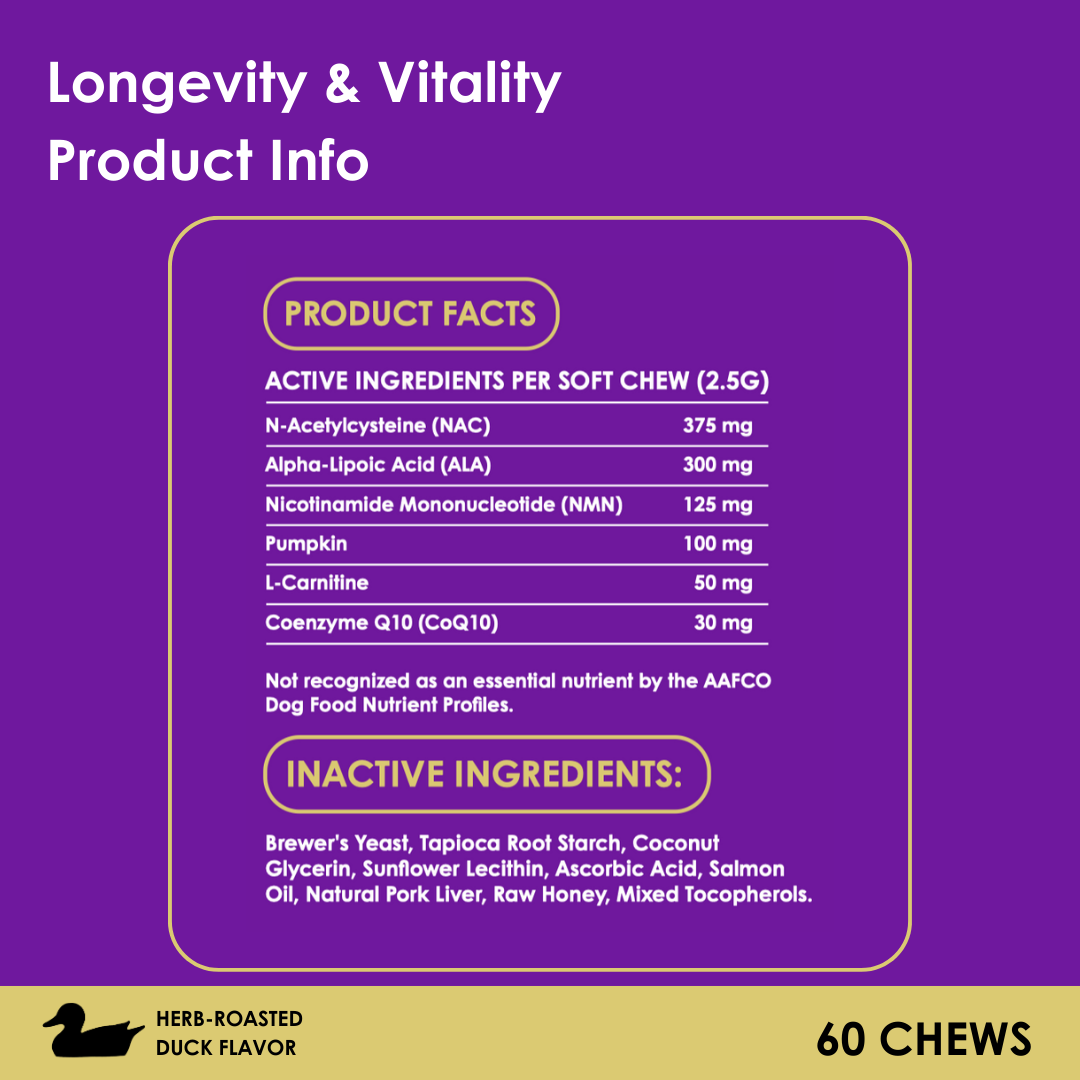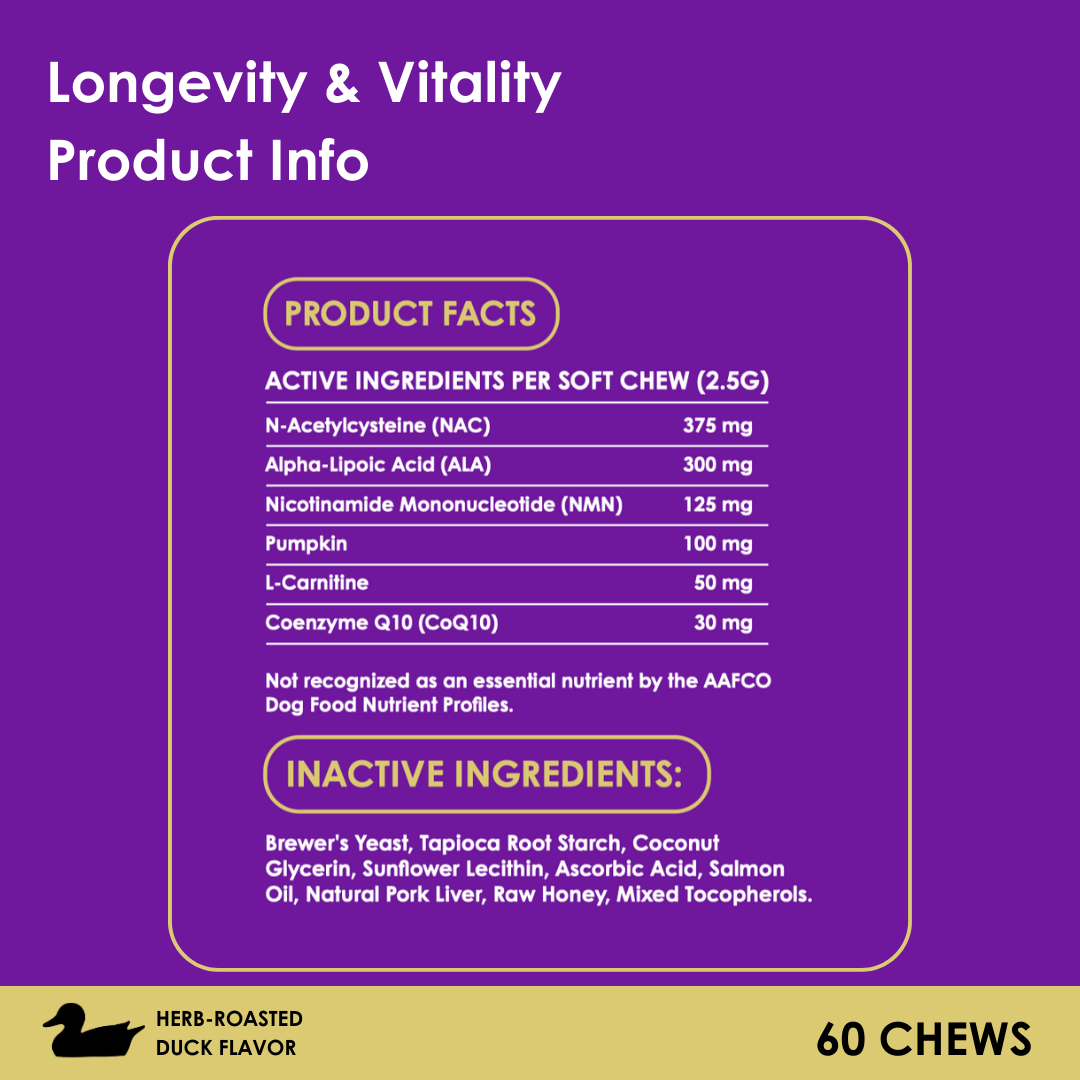What Dogs Can Teach Us About Longevity
Dogs, often referred to as "man's best friend," live their lives with a sense of joy, purpose, and simplicity that we can all learn from. Though their lifespans are much shorter than ours, dogs exhibit behaviors and lifestyles that provide us with profound insights into longevity—both for them and for us. By observing their habits, attitudes, and physical well-being, we can glean important lessons about living longer, healthier lives. Let's explore what dogs can teach us about longevity, and how we can apply these lessons to ourselves and our furry companions:
1. Consistent Physical Activity
Dogs are naturally active creatures, needing regular exercise to stay healthy and fit. Whether it’s a brisk walk, a run in the park, or a playful game of fetch, dogs thrive on physical activity. This constant movement keeps their joints, muscles, and hearts strong, helping them maintain a healthy weight and prevent chronic conditions like arthritis and obesity.
What We Learn: Consistent physical activity is essential for longevity. Regular exercise, whether it's walking, swimming, or yoga, helps improve cardiovascular health, maintain mobility, and increase lifespan. Dogs remind us of the importance of moving our bodies daily, and the benefits it can have for both physical and mental well-being.
2. Living in the Moment
One of the most striking traits of dogs is their ability to live fully in the present. Whether they're excited to see you, basking in the sun, or enjoying a simple meal, dogs are masters of mindfulness. They don’t dwell on the past or worry about the future—they focus on enjoying life in the moment.
What We Learn: Practicing mindfulness and living in the moment can reduce stress, improve mental health, and contribute to a longer, happier life. Stress has been shown to accelerate aging and contribute to chronic diseases. Dogs teach us to slow down and appreciate the simple pleasures in life, which can have a profound impact on our longevity.
3. Social Connections Matter
Dogs are inherently social animals, often forming strong bonds with their owners and other animals. Whether it’s playtime with fellow dogs or just curling up beside their human companions, dogs thrive on social interaction. This bonding is not just about companionship; it is vital for their emotional well-being.
What We Learn: Social connections and relationships are critical to longevity. Studies have shown that strong social networks can reduce stress, enhance mental health, and even extend life expectancy. Loneliness and isolation have been linked to higher mortality rates. Dogs remind us of the importance of maintaining strong, healthy relationships for a long and fulfilling life.
4. The Power of Rest
Dogs know how to rest—whether they’re napping in the middle of the day or settling in for the night. They instinctively know when to rest and recover after physical exertion. Rest allows their bodies to repair, their energy to replenish, and their minds to reset.
What We Learn: Adequate rest and sleep are vital for maintaining physical health, cognitive function, and longevity. Research shows that sleep is crucial for the body’s repair processes and overall well-being. Dogs remind us to balance activity with rest and ensure we get enough sleep to live a longer, healthier life.
5. Balanced Nutrition
A dog’s diet plays a critical role in their longevity. Dogs benefit from a well-balanced diet rich in essential nutrients that support their growth, energy levels, and overall health. Pet owners are often advised to provide their dogs with high-quality food, appropriate portions, and the right balance of protein, fats, and carbohydrates, as well as vitamins and minerals.
What We Learn: Just like dogs, humans need a balanced diet to promote longevity. A nutrient-rich diet filled with whole foods—vegetables, fruits, lean proteins, and healthy fats—helps reduce the risk of chronic diseases, improves immune function, and supports overall health. Dogs teach us the importance of feeding our bodies properly to ensure long-term vitality.
6. Adaptability and Resilience
Dogs have an incredible ability to adapt to changing environments, circumstances, and even health challenges. Whether recovering from an injury, coping with old age, or adjusting to new surroundings, dogs display remarkable resilience. Their ability to keep moving forward, even in difficult situations, is inspiring.
What We Learn: Resilience and adaptability are crucial for longevity. Life is full of challenges, but being able to cope with change, bounce back from adversity, and maintain a positive attitude are key factors in living a long, fulfilling life. Dogs show us how to approach life’s hurdles with optimism and perseverance.
7. Routine and Structure
Dogs thrive on routine. They feel secure and content when they have a predictable daily schedule for feeding, walking, and resting. Routine provides stability, reduces anxiety, and promotes a sense of well-being for dogs.
What We Learn: Routine and structure are equally beneficial for humans. Establishing regular habits, such as set mealtimes, sleep schedules, and exercise routines, can improve physical health, mental clarity, and emotional stability, all of which contribute to longevity. Dogs show us the value of creating a daily routine that supports our well-being.
8. Regular Health Check-Ups
Dogs rely on their owners to bring them to the vet for regular check-ups and preventive care. These visits help catch potential health issues early, provide vaccinations, and maintain overall health, ultimately contributing to a longer life.
What We Learn: Regular health check-ups are essential for early detection and prevention of diseases in humans. Routine medical exams, screenings, and preventive care are critical for maintaining health and identifying issues before they become serious. Dogs remind us of the importance of prioritizing our health through proactive medical care.
Conclusion: Dogs as Our Longevity Guides
In many ways, dogs embody the secrets to a long, healthy, and happy life. They remind us to move our bodies, live in the moment, maintain strong social connections, and balance activity with rest. Their adaptability, resilience, and appreciation for life’s simple pleasures offer valuable lessons in how we can enhance our own longevity. By learning from our dogs and applying these lessons to our daily lives, we can help not only extend our own lifespans but also ensure that our beloved dogs live long, vibrant lives by our side.
























